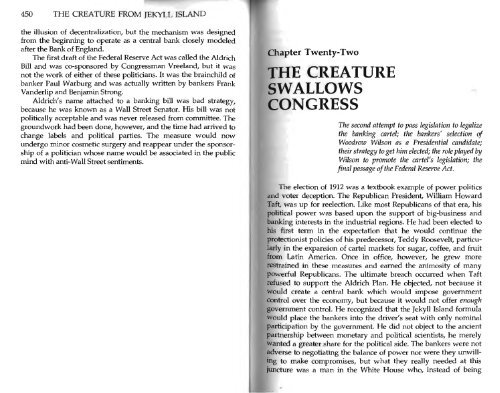Create successful ePaper yourself
Turn your PDF publications into a flip-book with our unique Google optimized e-Paper software.
450 THE CREATURE FROM JEKYLL ISLAND<br />
the illusion of decentralization, but the mechanism was designed<br />
from the beginning to operate as a central bank closely modeled<br />
after the Bank of England.<br />
The first draft of the Federal Reserve Act was called the Aldrich<br />
Bill and was co-sponsored by Congressman Vreeland, but it was<br />
not the work of either of these politicians. It was the brainchild of<br />
banker Paul Warburg and was actually written by bankers Frank<br />
Vanderlip and Benjamin Strong.<br />
Aldrich' s name attached to a banking bill was bad strategy,<br />
because he was known as a Wall Street Senator. His bill was not<br />
politically acceptable and was never released from committee. The<br />
groundwork had been done, however, and the time had arrived to<br />
change labels and political parties. The measure would now<br />
undergo minor cosmetic surgery and reappear under the sponsorship<br />
of a politician whose name would be associated in the public<br />
mind with anti-Wall Street sentiments.<br />
Chapter Twenty-Two<br />
THE CREATURE<br />
SWALLOWS<br />
CONGRESS<br />
The second attempt to pass legislation to legalize<br />
the banking cartel; the bankers 1 selection of<br />
Woodrow Wilson as a Presidential candidate;<br />
their strategy to get him elected; the role played by<br />
Wilson to promote the cartels legislation; the<br />
final passage of the Federal Reserve Act.<br />
The election of 1912 was a <strong>text</strong>book example of power politics<br />
and voter deception. The Republican President, William Howard<br />
Taft, was up for reelection. Like most Republicans of that era, his<br />
political power was based upon the support of big-business and<br />
banking interests in the industrial regions. He had been elected to<br />
his first term in the expectation that he would continue the<br />
protectionist policies of his predecessor, Teddy Roosevelt, particularly<br />
in the expansion of cartel markets for sugar, coffee, and fruit<br />
from Latin America. Once in office, however, he grew more<br />
restrained in these measures and earned the animosity of many<br />
powerful Republicans, The ultimate breach occurred when Taft<br />
refused to support the Aldrich Plan. He objected, not because it<br />
would create a central bank which would impose government<br />
control over the economy, but because it would not offer enough<br />
government control. He recognized that the <strong>Jekyll</strong> Island formula<br />
Would place the bankers into the driver's seat with only nominal<br />
participation by the government. He did not object to the ancient<br />
partnership between monetary and political scientists, he merely<br />
Wanted a greater share for the political side. The bankers were not<br />
adverse to negotiating the balance of power nor were they unwilling<br />
to make compromises, but what they really needed at this<br />
juncture was a man in the White House who, instead of being


